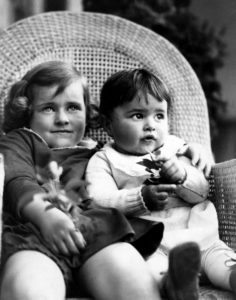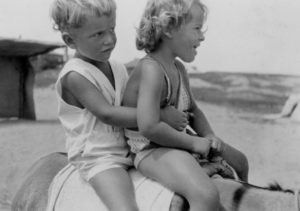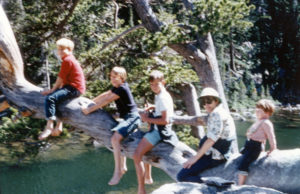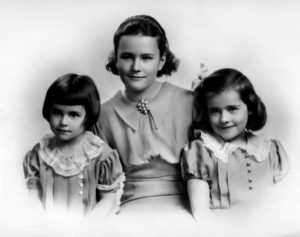 I have a few questions to start today’s article:
I have a few questions to start today’s article:
- Do you feel like you almost always have to be the “biggest” one in groups and gatherings, and you can’t just settle into being somewhere in the middle?
- Or, maybe you often feel like you can’t take your full stature, no matter what?
- Do you feel like someone or something is always missing in groups?
- Or, do you feel like you are the “third wheel,” an extra who can’t find their place, no matter what?
These are all questions that concern “horizontal” belonging. In constellation work, we are often focused on “vertical” belonging: our relationships with the ancestors who preceded us, and the descendants who will follow. How connected we are in these relationships, as I have written elsewhere, often determines just how much we can feel rooted and in a good place in life.
But there are many aspects of belonging, and another one relates to our “horizontal” relationships, especially how we feel in groups and in peer networks, like friends and colleagues.
Obviously, ancestral rootedness, as well as our actual experience of being parented in childhood, greatly impacts peer relationships, too. But today, I want to look at a set of relationships that often gets short shrift in understanding our strengths and challenges in peer relationships:
In that context, let me ask a few more questions:
- Did any of your siblings, especially an older one, die in childhood?
- Were any of your siblings adopted out of the family?
- Are you an adoptee, with lost biological siblings, and/or new adoptive ones?
- Do you have step-siblings, and were some sets of siblings favored over others?
- Were you bullied by, or did you bully, a sibling?
- Did you have a sibling with chronic illness, developmental disability, or other condition that required more family attention than the others?
- Did you have aborted siblings?
- Were you given a “spot” in the birth order that wasn’t proper to you? (For instance, being called the “first” when there was an older child who had died, and who was really first.)
- Did you have to parent a parent, or did you become “spousified” due to parental neediness and lack of boundaries, or did you have to take care of other siblings in a parental way for whatever reason?
- Were you an only child for whom that was a difficult experience?
 Sibling relationships are our first and most important encounter with “horizontal” relationships. (Soon, there will be neighbors, schoolmates, cousins and others who are important, too, but in most instances, sibling relationships will outweigh these in impact.)
Sibling relationships are our first and most important encounter with “horizontal” relationships. (Soon, there will be neighbors, schoolmates, cousins and others who are important, too, but in most instances, sibling relationships will outweigh these in impact.)
When these relationships are ordered well,
they support the development of our capacity to relate in peer relationships. But when there are extreme losses, improper orderings, forgotten ones, or inappropriate roles, we can be set up for ongoing unhealthy or difficult patterns of peer relating.A client of mine, for instance, had been treated her whole life as a first born child. In her 40s, she and her younger siblings discovered that her mother had a child that she had adopted out before marrying their father. She experienced enormous relief that was hard to explain but deeply felt when I told her “You know, you aren’t a first born. You are a second born.” It made a huge difference in her sense of her “fit” in the world, and something that had always felt off.
Another client always felt like he was trying and failing to make things right in life. He had an older developmentally delayed brother, whom he had had to help a lot when he was growing up. I invited him to hear his older brother saying “Dear brother, thank you for all your help. But I am the older brother, and you are the younger brother.” Again, the client felt a huge but hard-to-explain relief at hearing this. We understand: my client is the more capable, and his help was needed. But it makes a big different when you help from your proper place, and aren’t required to be something you aren’t.
 For many clients, the experience of being bullied by a sibling lingers deeply into adulthood, even if there is reconciliation. There is sense of deep hurt that is hard to shake. Basic care and safety between siblings should be taken for granted, and parents should watch out and teach children who may not fully understand their actions yet that they have to not injure each other. The lack of parents keeping siblings safe for each other lingers profoundly for us.
For many clients, the experience of being bullied by a sibling lingers deeply into adulthood, even if there is reconciliation. There is sense of deep hurt that is hard to shake. Basic care and safety between siblings should be taken for granted, and parents should watch out and teach children who may not fully understand their actions yet that they have to not injure each other. The lack of parents keeping siblings safe for each other lingers profoundly for us.
When we take a closer look at bullying between siblings, we almost always find that it’s a replay of a conflict that went unresolved well before the siblings were ever born. Sometimes it’s quite personal, like two brothers who betrayed each other a generation before. Sometimes it’s a replay of wars between peoples, with perpetrators and victims being memorialized in our sibling experience.
There are so many ways the losses and injuries with siblings can linger for us. These are only a few. But I’ve found over and over these relationships are NOT trivial in terms of our personal development. They are often strong influences on how we relate to peers and groups today.
The constellations I facilitate on sibling issues are often among the most tender and bittersweet ones that I do. The desire for closeness with siblings is deep, and the recovery of proper relationship with lost or conflicted siblings is very powerful.

Your words really move me. There weren’t any dead or adopted out kids that I know of, but there was an intense uneasiness and competitiveness in our family that strongly shaped “us four kids” who were little over a year apart, how we related to each other and who we got to be and didn’t get to be in life. I’d love to do a workshop on sibling constellations if you decide to do one.
Thank you for responding, Sharon! And yes, there are SO many different ways the relationship between siblings can get distorted. When that happens, we carry those distortions into adulthood. Favoritism, illness, loss, war – so many things can prevent siblings from having an ordered and safe relationship. That’s a grand idea – I will keep it in mind!